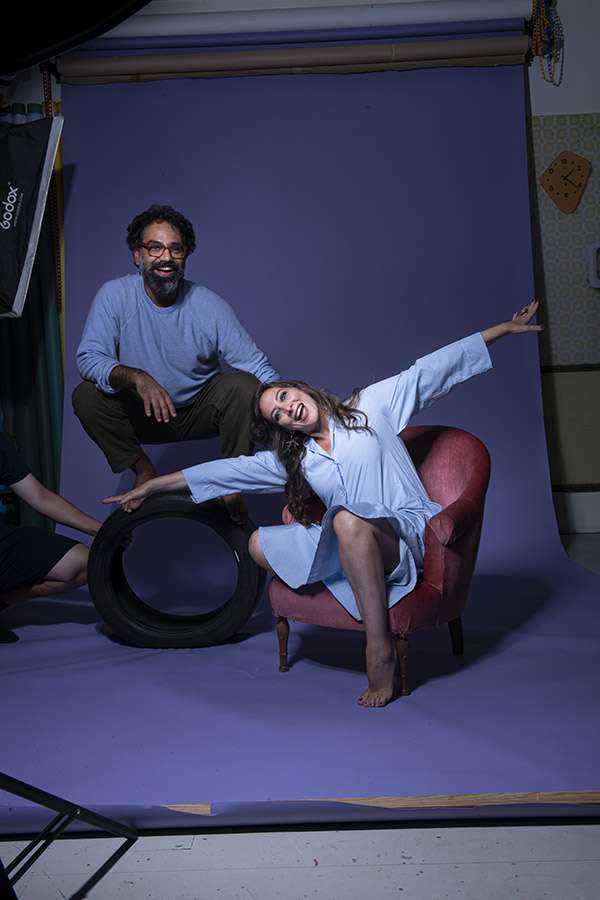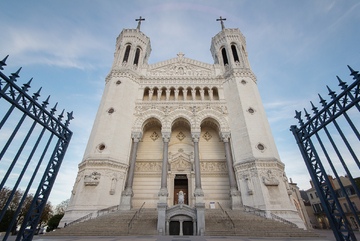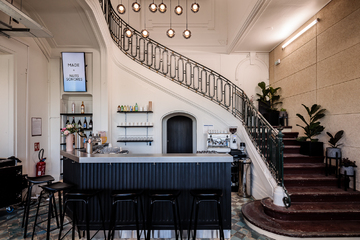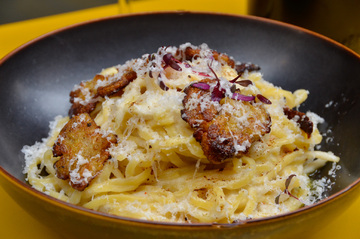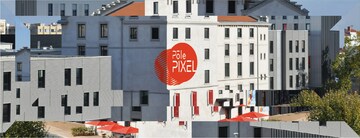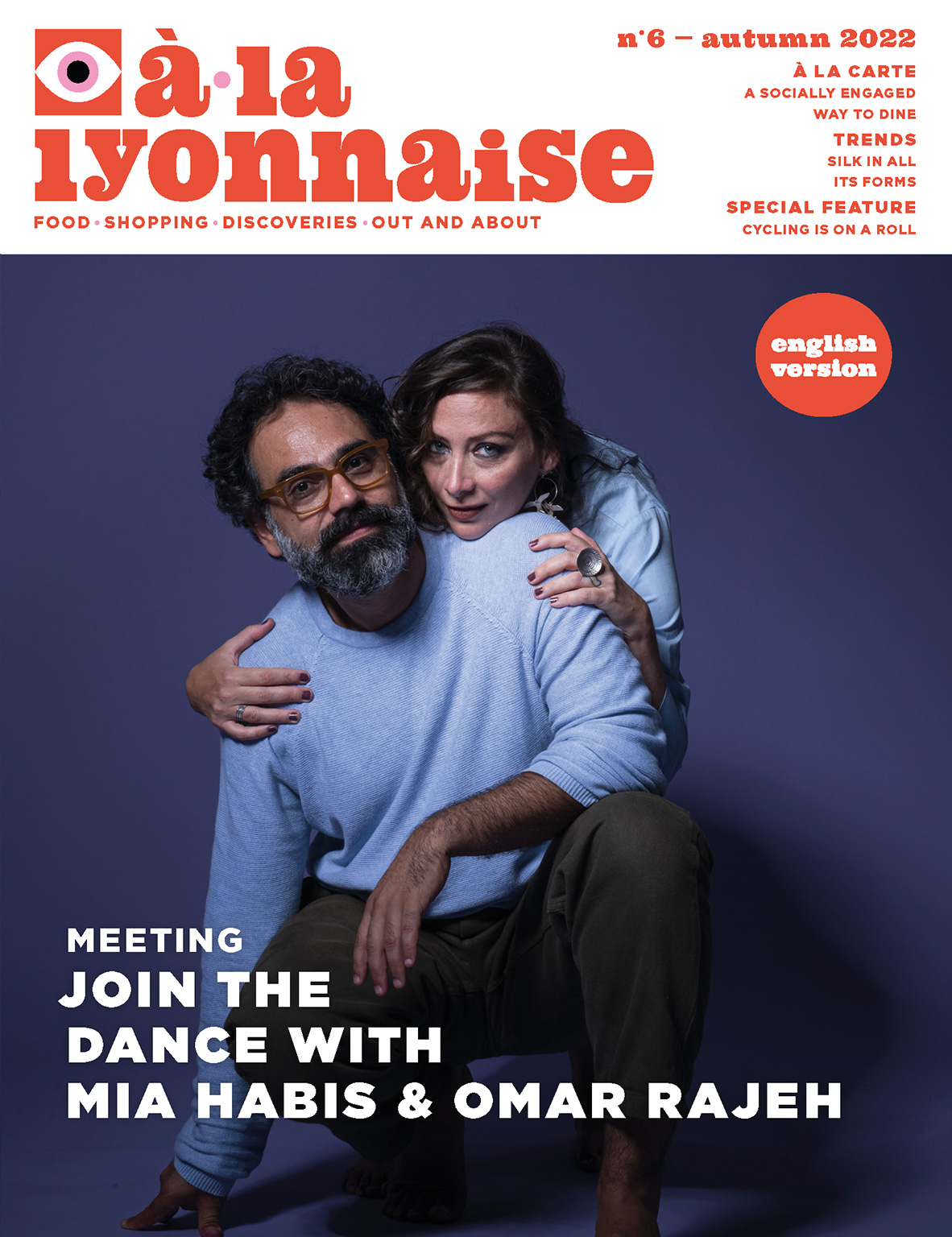Mia Habis et Omar Rajeh

She is a dancer and he is a choreographer. Mia Habis and Omar Rajeh left Lebanon for France three years ago. After falling in love with the city on their journey, Lyon became their adopted home and the headquarters of their company, Maqamat, which was invited to take part in Lyon’s next Contemporary Art Biennale.
You are both originally from Lebanon. How did you end up in Lyon?
Mia Habis : We also considered Germany, but, because I am a French-speaker, it was easier to come here. We have always loved Lyon. We travelled through the city several times. Geographically speaking, it was convenient, as Omar travels a lot, working with people in Italy, Switzerland and Belgium. Lyon is in the centre; it has a strategic location! It also has a lively dance and art scene.
Omar Rajeh : Our priority was our child (Editor’s note: they have a 7-year-old boy, Kinan). We wanted a place that was safe, calm and full of joy. As we come from a country where the situation is complicated, we needed a rest. Three years after arriving here, Lyon is every bit as beautiful; we are happy to return here after travelling! The people are really kind and welcoming here. It’s what we were looking for.
What were your first emotions, culturally and artistically speaking, when you arrived here?
O.R : I love the parks. We live near the river banks and I love taking strolls along the river. I also love the Place des Terreaux, which is one of the first images of Lyon that was engraved in my mind. We actually live right next to this square.
M.H : I was struck by a strong feeling the first time I went to Tête d’Or Park. I wasn’t expecting to see such a vast expanse of greenery! It really made an impression on me. I also love the energy of the culture scene; we like to visit different places and discover their individual personalities. I have some great memories of experiences at the Opéra Underground, the Théâtre de la Croix-Rousse, and the Villa Gillet. Our latest memorable experience was the concert by Jungle at the Nuits de Fourvière festival!
At the end of March, you were approached to take on the management of the Maison de la Danse. What does working together, as a pair, mean for you?
M.H : When we met in Beirut, our relationship was artistic and professional before becoming romantic. We started working together in 2008. Omar was looking for a dancer and he invited me to join his show. Very rapidly, I started taking on more responsibilities, helping him with his choreographies, costumes, scenography and dramaturgy. Working as a pair means we can share the weight of responsibility. We often agree on things, but it’s even better when we don’t. It creates a discussion and puts us in an open, non-confrontational attitude towards each other.
O.R : The project with the Maison de la Danse didn’t happen for us in the end, but it was a very positive experience and we got great feedback from the jury. We really wanted the position, but we also understand all the factors going into the decision. It was a good exercise for us, to strengthen our vision of things, our philosophy, which we can apply in future projects.
Beyond dance, you’re highly engaged in contemporary art. You even opened a centre in Beirut, which had to close down… What happened?
M.H : It was a metal and wood structure measuring more than 1000 m², including several stages, studios, and a restaurant. We designed it to be like our dream space. The centre was dismantled and was supposed to be rebuilt, but the economic and political situation we were confronted with in Lebanon prevented us from doing it.
O.R : Having a space like that in Beirut was not easy; we had to fight for it. It was a real disappointment when we had to move. The idea of ‘Citerne’ was to create a huge building and bring some energy to the city. The situation went downhill very rapidly and, in 2019, we felt like it was time to leave. We accomplished so much in two years! There were many times when we had to act urgently and expect the worst to happen. Our disaster management experience came in useful when the pandemic happened! (Laughs).
Could you tell us about the piece you will be presenting at the Contemporary Art Biennale? A work on the theme of fragility…
M.H : The project is called ‘Walking in Wrinkles’. We will be located at the Fagor factories, where we have created a mobile structure, with robotics, which moves through space. It interacts with the presence of people around it. In the structure, there is a screen that displays a series of images from a film. We worked on the film, dance and robotics aspects with George Macbriar, an incredible hundred-year-old Scot, who lives in Albertville. Looking at his body and the number of things he has accumulated enabled us to work on fragility, as well as strength and the passage of time. The result is very poetic and visual, like a journey through shapes and bodies. It gives us hope for the future.
Do you feel at home now in Lyon?
O.R : I don’t feel like I’m in exile at all! We didn’t want to move to a place where we would feel like foreigners. Nationalities are not that important in the world. We aren’t French; we don’t belong anywhere, but we know where we come from and what we are doing. I never feel like a foreigner anywhere. Even when travelling, I always feel comfortable, like I’m at home. We haven’t lost our home in Beirut; we have found a new home.
M.H : We have come to a place that we respect, including its people and its history. We are respected in turn, including all of our baggage and who we are. Having lived in London, Lebanon, Paris and Lyon, I always feel at home and I know that I will return home.
What are your desires for the future?
M.H :We want everything! (Laughs). At the moment, we are wrapped up in this project; at the same time, we are moving into teaching. In fact, we ran some workshops this summer. We are also thinking about whether we want to continue our festival BIPOD in Beirut, or not. There are some great projects in the pipeline for our digital platform and Omar will be appearing on stage soon, in various places around Europe, performing some of his old pieces.
With all these projects, do you still find the time to dance?
O.R : (Laughs). For us, all of these projects are a kind of dance! When I started working in Beirut, it wasn’t my ambition to manage a festival; it happened through a combination of opportunities and circumstances, because we had to start from scratch. I always see things this way. Artists need to be increasingly involved in the decision-making process, to make their voices heard and inspire others.
Biography
Mia Habis and Omar Rajeh are both dancers. He is the choreographer, while she performs. Together, they manage the company Maqamat, which was created in Lebanon in 2002, and has been based in Lyon for the past three years. Exhausted by a toxic economic and political climate in Lebanon, they moved to Lyon, with their son, at the dawn of the first lockdown. Based in the city’s 1st district, near the banks of the Saône, they have just completed their latest work, combining robotics and choreography, which will be presented this autumn at Lyon’s Contemporary Art Biennale.
Born in London, in 1979, Mia began classical dance at the age of three, and also studied martial arts, drama and singing. She studied literature and marketing in both Beirut and the Sorbonne, in Paris. She met Omar on stage before becoming the artistic director of the festival BIPOD.
Born in Beirut, in 1975, Omar established himself as a major figure in dance, in France and the Middle East. His creations are presented around the globe. His intense, engaged work explores social conflicts that are tearing apart his country, through bodies.
Mia's favourite addresses
“A very pleasant place, both on the terrace and inside, where the food is simple, creative, subtle and lovingly prepared.”
“We can see the Basilica from our home. I love this place. It was one of the first attractions we visited when we arrived in Lyon. I still enjoy strolling here and admiring the view just as much. I find it soothing.”
"Un lieu vivant, chaleureux et agréable, dans sa composition et ses propositions. J’apprécie de m’y attabler et d’y faire des découvertes artistiques, ça me rappelle le Citern Beirut que l’on voulait créer."
Omar's favourite addresses
“We come here all the time. It’s a tiny place, where they make their own pasta. Everything is delicious and they are very friendly. We both fell in love with this place. Are you sure we can’t mention it twice in our favourite addresses?”
Quai Saint Vincent, Lyon 1er“I love the way the city and nature come together here. It’s near to our home and Les Subsistances, a place that has played an important part in our adventure in Lyon. I like strolling along the river.”
“This is a beautiful, energy-filled place, where we can meet various artists we work with. There is the Grame (Translator‘s note: a centre that creates resources and activities for musical exploration), for example, with which we are building a three-year project, as part of our platform citerne.live.”
